Index relies entirely on the support of donors and readers to do its work.
Help us keep amplifying censored voices today.
Index on Censorship recently appointed a new youth advisory board who attend monthly online meetings to discuss current freedom of expression issues and complete related tasks. As their first assignments they were asked to provide a short bio to introduce themselves, along with a photograph of them holding a quotation highlighting what free expression means to them.
Simon Engelkes 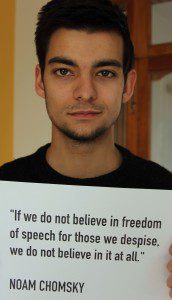
I am from Berlin, Germany, where I study political science at Free University Berlin. I have worked as an intern with Reporters Without Borders and RTL Television, which made me passionate about the importance of freedom of speech.
I believe that freedom of expression forms an important cornerstone of any effective democracy. Journalists and bloggers must live without fear and without interference from state or economic interests. Unfortunately, this is not the case. Journalists, authors and everyday citizens are imprisoned or killed by radicals, state agencies or drug cartels. Raif Badawi, James Foley, Khadija Ismayilova, Avijit Roy – the list is endless.
We need to remind ourselves and the powerful of today, that freedom of expression as well as freedom of information are basic human rights, which we have to defend at all costs.
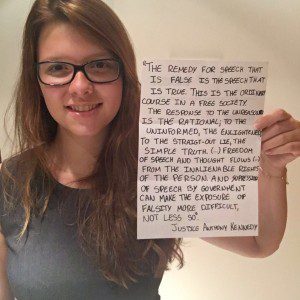 Mariana Cunha e Melo
Mariana Cunha e Melo
I am from Rio de Janeiro, Brazil. I graduated from law school in Rio and I have a degree from New York University School of Law. My family has taught me about the dangers of censorship and dictatorship, so I have always been interested in studying civil rights. This was the main reason I decided to study law.
I grew up listening to stories about the media censorship in Brazil during the military dictatorship. The fight against the ghost of state censorship has always sounded very natural to me – and, I believe, to all my generation. When I finished law school I found out that the new villain my generation has to face is the censorship based on constitutional values. The argument has changed, but the censorship is not all that different. So I decided to dedicate my academic and my professional life as a lawyer to fight all sorts of institutionalised censorship in Brazil.
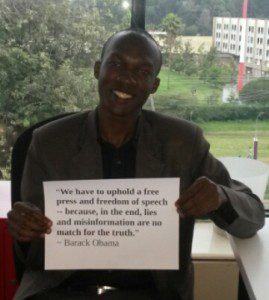 Ephraim Kenyanito
Ephraim Kenyanito
I was born and raised in Kenya, and I am currently working as the sub-Saharan Africa policy analyst at Access Now, an international organisation that defends and extends the digital rights of users at risk around the world. My role involves working on the connection between internet policy and human rights in African Union member countries. I am an affiliate at the Internet Policy Observatory (IPO) at the Center for Global Communication Studies, University of Pennsylvania. I also currently serve as a member of the UN Secretary General’s Multi-stakeholder Advisory Group on internet governance.
The reason why I have always been passionate about protecting the open internet is that it is a cornerstone for advancing free speech in the post-millennium era and there is a great need to build common ground around a public interest-oriented approach to internet governance.
Emily Wright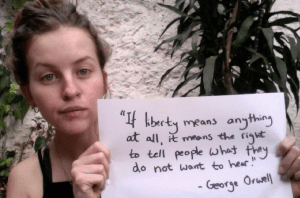
I grew up in Portugal, and I am now based between London and Bogotá, Colombia. I am a freelance filmmaker and journalist. Working in documentary production and community-based, participatory journalism informed a growing interest in journalistic practices, freedom of expression and access to information.
I believe that one of the greatest threats to freedom of expression is the flagrant violation of civil liberties under the banner of national security. The war on terror, underscored by Bush’s declaration “You’re either for us or against us”, has collapsed the middle ground, suppressing any struggles that challenge that statement. Freedom of expression has become a pretext for silencing those who have the least access to it; those who do not fall in line with the global order’s supposed defence of freedom against barbarism and obscurantism.
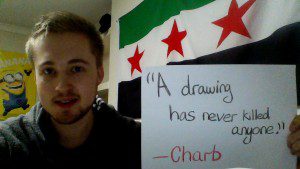 Mark Crawford
Mark Crawford
I’m originally from Birmingham, and now a postgraduate student at University College London, specialising in Russian and post-Soviet politics. This has inevitably educated me on the pressures exerted upon freedom of expression in Russia, whose suffocated and disenfranchised opposition journalists I am currently investigating.
Hostility to free expression has become a staple of my university life. Rather than developing a coherent set of ideologies to challenge toxic values in the open, it has become mainstream for students of the most privileged universities in the world to veto them on behalf of everyone else, no-platforming and deriding free speech.
I am convinced that there is no point fighting for an egalitarian society if any monopolies over truth are permitted. Freedom of speech is, therefore, something I am keen to promote in whatever small way I can.
Madeleine Stone 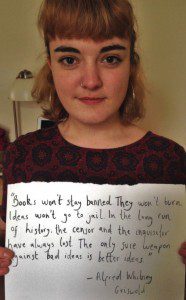
My home is in south-east London but I spend most of my time in York, studying for my bachelor’s degree in English and related literature. I am currently the co-chair of York PEN, the University of York’s branch of English PEN, and a founding member of the Antione Collective, a human rights-focused theatre company.
Studying literature from across the globe has introduced me to issues of freedom and censorship, and the devastating effects censorship can have on national progress. Freedom of expression on campuses is hugely important to me as a student and it is currently under threat. Well-meaning individuals are shutting down the open debate that is vital to academic institutions. The only way to fight harmful ideas is to engage them head-on and destroy them through academic debate, not to ban them.
Layli Foroudi 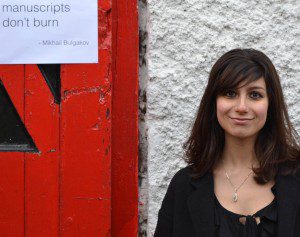
I am a journalist and student currently studying for a MPhil in race, ethnicity and conflict at Trinity College Dublin. It was studying literary works from the Soviet period during my undergraduate degree in Russian and French at University College London that initially highlighted the issue of censorship for me. The quote I selected, “manuscripts don’t burn”, is from the book Master and Margarita by Russian author Mikhail Bulgakov. He wrote about the hardship that many writers faced as they had to adjust their own writing in accordance with the authority, as well as the fact that not all that is written can be taken to be true.
I think that these themes are very relevant today. Whether people are censored or self-censor out of fear of punishment or of being wrong, limiting freedom of expression results in loss of debate, of exchange and of creativity. Being denied freedom of expression is being denied the right to participation in society.
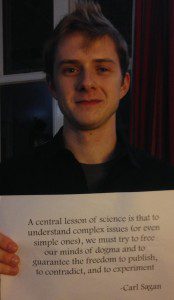 Ian Morse
Ian Morse
I have been involved in journalism since I began studying at Lafayette College, Pennsylvania, USA, and have been engaged in press freedom and reporting in three countries since then. I studied in Turkey last spring, where I interviewed and wrote about journalists and press freedom. It motivated me to begin researching and writing on my own about these topics. Now, as I study for a semester in Cambridge in the UK, I continue to talk about and advocate for free speech and press.
I find it absolutely amazing the power words and information can have in a society. It becomes then extremely damaging to realise that some things cannot be published because they conflict with those in power. Free speech is now becoming a hot topic around the world, particularly among youth, and it makes it all the more important to be able to approach freedom of expression critically and objectively.
Freedom of the press has always been a pretty reliable litmus test for the state of any democracy. However, as Index on Censorship’s Mapping Media Freedom project shows, countries that are seen as traditionally open, with constitutions protecting freedom of expression, are currently rife with violations against the media.
“It is extremely troubling that media workers have been physically and sexually assaulted, arrested and denied access to key reporting areas in countries with strong democratic institutions,” Hannah Machlin, Index’s Mapping Media Freedom project officer, said. “We hope governments take action to prevent these types of violations from occurring at such a frightening rate.”
So far this year, Mapping Media Freedom has verified 61 media violations. Here are just five examples from the last fortnight that highlight some of the failures of these democracies to live up to their own standards.
Just weeks after hundreds of women were sexually assaulted on the streets of Cologne, a journalist, Esmeralda Labye, was sexually assaulted while reporting from the Cologne carnival for Belgian TV station RTBF on 4 February. One man grabbed her breast and another kissed her neck while she was live on air.
“Two or three men gathered behind me and attempted to make themselves the centre of my attention,” Labye told The Guardian. “I was focusing on the broadcast, and then I felt a kiss on my neck.”
Writing for RTBF online, Labye condemned the “wretched and cowardly men” who assaulted her and complained of the increasing difficulty for female journalists to do their job without being harassed.
On 4 February, plans to increase the role of the CSA — the French broadcast watchdog whose members are chosen by the government — as a guarantor of the independence of the media were discussed in the French National Assembly.
The French journalists’ union SNJ criticized the planned bill, written by a Parti Socialiste MP, stressing that the CSA is not independent from political influence. They wrote: “The CSA has no responsibility and legitimacy on matters related to the control of information or journalists. It should have none!”
Skirmishes in Athens as general strike sweeps Greece https://t.co/orKiM5U9JB pic.twitter.com/txqnQrVhYg
— Kathimerini English (@ekathimerini) February 4, 2016
Protests against the Greek government’s plan to change its pension policy as part of the country’s third international bailout brought an estimated 40,000 people onto the streets of Athens and other cities, including journalists. On 4 February, Dimitris Perros, a journalist from the local radio station Athens 9,84, was violently attacked by unknown assailants while covering the demonstration. He was transported to the hospital with major injuries.
Newspapers reported that the attack was denounced in statements from across the political spectrum including Syriza,PASOK and the Greek Communist Party and the Journalist’s Union of the Athens Daily Newspapers. “The strangers who approached him asked him first if he is a journalist and when he answered affirmatively they started beating him with planks, while the police looked on,” the union stressed in an announcement.
On 28 January, several journalists were denied access to a citizens’ meeting about the possible creation of a new asylum seeker centre in the village of Luttelgeest, according to newspaper reports. An emergency regulation was issued to refuse journalists access to the meeting. The mayor also banned journalists from travelling within a radius of five kilometres of the village.
The Dutch Association of Journalists, the NVJ, condemned the measure saying that it was not the first time journalists have been banned. “It has happened many times now,” NVJ secretary Thomas Bruning said. “If journalists are denied access, they are obstructed from doing their job. This is alarming and should not happen in a democracy.”
By seizing control of the media, whose footsteps is #Kaczynski following on? #Poland #Putin https://t.co/vIbDWgrG6q
— The Globalist (@theglobalist) February 8, 2016
Even Europe’s youngest democracies are fighting off attacks on media freedom.
As Index on Censorship has previously reported, there is a growing trend in Poland of the government using defamation actions to stop criticism in the media. The most recent example, on 3 February, saw Poland’s ruling Law and Justice party, PiS, file a libel suit against the largest daily newspaper in the country, Gazeta Wyborcza about an opinion piece it disliked.
The article argued that PiS and Poland’s president Andrej Duda have behaved like a “mafia state” for pardoning former anti-corruption official Mariusz Kaminski, for abuse of power. Duda issued the pardon before Kaminski had exhausted the appeals process, a point that the author of the piece, Wojciech Czuchnowski, criticised in his opinion piece.
This article was originally published on Index on Censorship.
Mapping Media Freedom
|
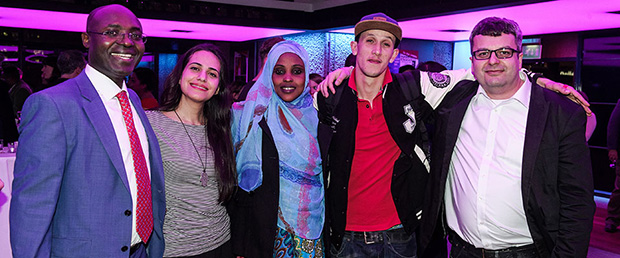
Rafael Marques de Morais, Safa Al Ahmad, Amran Abdundi, Mouad “El Haqed” Belghouat and Tamas Bodokuy (Photo: Alex Brenner for Index on Censorship)
When times get tough, freedom of expression can quickly fall down the list of priorities. But it is exactly in these circumstances when the ability to communicate and express yourself is most important. For this reason, we continue to draw inspiration from last year’s Index on Censorship Freedom of Expression Awards fellows and their struggles to keep freedom of expression alive and well.
As we look forward to the 2016 Index awards, here is our latest reminder of just how important a job our past winners do in the fight for free speech.
Tamas Bodoky, Atlatszo.hu / Digital Activism
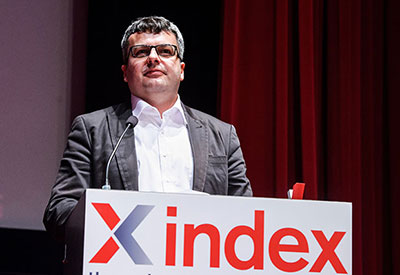
Last year was a positive one for the Hungarian investigative journalism site and NGO Atlatszo. The site’s yearly report reveals that funding was on the up and readership remained high.
The report also outlines the site’s main investigations over the course of 2015, which include exposing state corruption, public budget spending, irregularity within EU funding and land lease and privatisation controversies.
The website’s project for tracking down hate crime gained traction in 2014, and last year expanded to include “violent football hooligan groups and clergymen, who are close to the far-right,” the site’s executive director Tamas Bodoky told Index on Censorship.
“Unfortunately, some people became very hostile to our refugee crisis reporting last year, saying things like ‘go to hell, Atlatszo, for helping them’,” he added.
Atlatszo made 90 freedom of information requests as an organisation — plus hundreds of requests submitted by staff in their own names. Around 50% of Atlatszo’s requests were at least partially granted. Of those that weren’t, the site has initiated court proceedings to obtain the information, with almost half so far being successful, with several others pending.
Going forward, Atlatszo has plans to expand by working with more bloggers and developing a new website allowing Hungarian citizens to “question representatives of Hungary in EU, members of the Hungarian Parliament and — in the long run — representatives of the local governments”. The kepviselom.hu (my representative) project is currently seeking donors through crowdfunding.
“The Index award certainly helped get more international recognition over the last year,” Bodoky said. “As a very small news organisation, we constantly struggle for visibility, and Index on Censorship was instrumental in raising the visibility of our cause.”
Safa Al Ahmad / Journalism
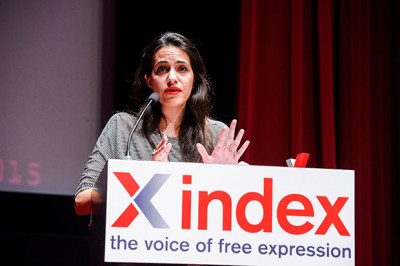 With the political crisis in Yemen steadily getting worse since last year, any plans Safa Al Ahmed had to switch focus were sidelined as she returned to the battle-scarred country.
With the political crisis in Yemen steadily getting worse since last year, any plans Safa Al Ahmed had to switch focus were sidelined as she returned to the battle-scarred country.
“I filmed events in Aden and then Taiz, which is currently besieged,” the award-winning journalist told Index on Censorship. “I’m going to be producing two separate films for both cities because north and south have very different dynamics.”
Actually getting into Yemen is a real task in itself. Al Ahmed and her crew took a boat from Djibouti to Aden, which took 34 hours, and then travelled for another day off-road and across mountainous terrain, passing snipers along the way.
With the execution of the prominent Shia cleric Nimr al-Nimr, Al Ahmad’s own country Saudi Arabia was briefly catapulted back into international focus at the start of 2016, but it didn’t last. “There is very little investigative journalism being done on the ground, which makes reporting difficult as there isn’t very much to build on,” Al Ahmed says.
Citing the flogging of blogger Raif Badawi as an example of how brutal the Saudi regime is of critical voices, Al Ahmad describes the state of free speech in Saudi Arabia as “frightening”. “The government have passed really wide rulings and laws so they can stop or arrest anyone for the simplest of reasons, including talking about the war in Yemen, which has been banned,” she explains.
The big difference between now and 2014 is that people are currently receiving death sentences, which is “a whole different level of intimidation”.
Mouad Belghouat aka El Haqed / Arts
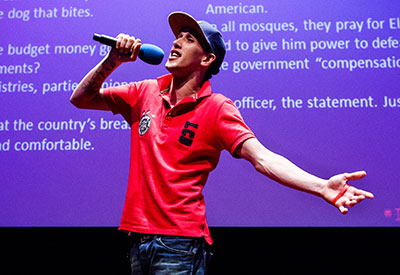 Last time we caught up with Moroccan rapper Mouad Belghouat, aka El Haqed, in October, he was in his home country keeping a low profile, while looking forward to performances in Florence, Italy, and at the 25th anniversary of the Moroccan Association of Human Rights in Brussels. Since November 2015, he has been living in Belgium, having applied for refugee status.
Last time we caught up with Moroccan rapper Mouad Belghouat, aka El Haqed, in October, he was in his home country keeping a low profile, while looking forward to performances in Florence, Italy, and at the 25th anniversary of the Moroccan Association of Human Rights in Brussels. Since November 2015, he has been living in Belgium, having applied for refugee status.
“In Morocco I felt threatened and under constant control,” he told Index this month. “It’s been hard, because already I miss the place where I grew up; I miss my family and my friends.” The situation in Morocco “deteriorates more and more every day, at all levels”, he explains, but vows one day to return.
He has now been cleared to work in Belgium, and has also turned his attention to creating more music. “I’m trying to finish the album I’ve been writing based on my experiences in prison in Morocco, and — as the last set of concerts have gone so well — I will be performing in Belgium in March and am looking to tour Norway come April.”
There are also plans for a biography based on his experiences from 2011, when his music became an anthem for many Moroccans involved in the Arab Spring, right up to his persecution at the hands of the authorities, right up to his eventual self-imposed exile.
As for the Index award, he said: “Through Index, I met many great people from all over the world who share the same principles as me, and word of my case has spanned the breadth of the world.”
Amran Abdundi / Campaigning
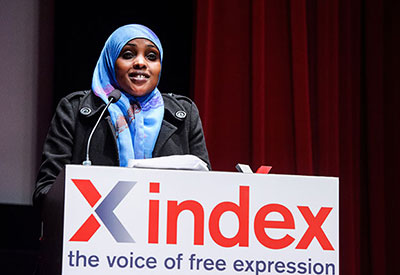 During our last conversation with Amran Abdundi, we discussed the attack in her native Kenya by Al-Shabaab linked terrorists on Garissa University College, in which 148 people were murdered. Abdundi, who knows many students from the college, immediately joined with other women leaders to organise strong community protests against Al-Shabaab.
During our last conversation with Amran Abdundi, we discussed the attack in her native Kenya by Al-Shabaab linked terrorists on Garissa University College, in which 148 people were murdered. Abdundi, who knows many students from the college, immediately joined with other women leaders to organise strong community protests against Al-Shabaab.
Last month, Abdundi attended the re-opening ceremony for Garissa University College. “I was happy to meet victims who I offered counselling to after the attack, and see them now back on their feet, ready to study and achieve their dreams,” she told Index.
She has also been busy recently with the upcoming launch of the new Frontier Indigenous Network website and implementing a new social media strategy to foster better connections between Kenyan women and the rest of the world.
As part of this new development plan, 2016 is packed with new projects, including an education programme on non-violence to counter violent extremism and radicalisation. The project will bring together Christians and Muslims together in “preaching peace and reconciliation”.
“All of this wouldn’t have been possible without the Index award and the support I have received from Index on Censorship, which led me to meet key individuals, such as Kenya’s woman minister, Anne Waigiru.”
Rafael Marques de Morais / Journalism
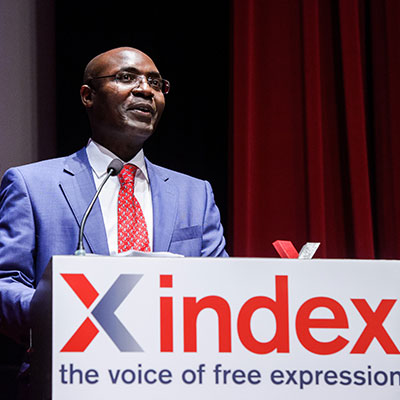 President José Eduardo dos Santos has been in power in Angola for over 35 years and his regime faces criticism on many fronts for, among other things, land grabbing, human rights abuses in Angolan prisons and the divvying up of the country’s resources to his family “like it was their inheritance”. These are just some of the issues Index award winner Rafael Marques de Morais is focusing on his activism and writing.
President José Eduardo dos Santos has been in power in Angola for over 35 years and his regime faces criticism on many fronts for, among other things, land grabbing, human rights abuses in Angolan prisons and the divvying up of the country’s resources to his family “like it was their inheritance”. These are just some of the issues Index award winner Rafael Marques de Morais is focusing on his activism and writing.
“This kind of work generates all sorts of troubles, because when you speak out against the president, you become suspect,” de Morais told Index on Censorship.
Being a high-profile activist within the country, there is a misconception that de Morais doesn’t feel the full force of the regime. “I might be ‘free’ but I can’t go anywhere; when I went for a drink recently the person I was with noticed we were being watched,” he explains. When he tried to enter a courtroom in December to observe the case involving the 15 Angolan bloggers now under house arrest, he was denied access. “Immediately the news on television was that I tried to enter the court illegally, because being high profile, the main thing they can attack is your reputation.”
Coupled with the ongoing economic crisis in Angola preventing citizens from taking money out of the bank, times are tough. “How is one supposed to survive and keep going?” he asks.
But go on he does. The attention from home and abroad, including that generated by the Index award, have provided some solace. “It’s always refreshing to know that people are interested,” he explains. “The award provides great encouragement for one to keep going.”
“But that’s it. The next day, you are back to struggling for survival.”
The Index on Censorship 2016 Freedom of Expression Awards shortlist has been announced.
An Aleppo-based journalist training women to report on the crisis in war-torn Syria, an Indonesian comic who jokes about Islamic extremism and a 19-year-old campaigner against repression in Eritrea are among those shortlisted for the 2016 Index on Censorship Freedom of Expression Awards.
Drawn from more than 400 crowdsourced nominations, the Index awards shortlist celebrates artists, writers, journalists and campaigners tackling censorship and fighting for freedom of expression. Many of the 20 shortlisted nominees are regularly targeted by authorities or by criminal and extremist groups for their work: some face regular death threats, others criminal prosecution.
Judges for this year’s awards are Nobel Prize-winning author Wole Soyinka, pianist James Rhodes, tech entrepreneur Bindi Karia, Colombian journalist Maria Teresa Ronderos, human rights lawyer Kirsty Brimelow QC and Bahraini campaigner Nabeel Rajab.
“Censorship is not something that happens ‘somewhere else’,” said Jodie Ginsberg, CEO of Index on Censorship. “It occurs on a daily basis in every country, in every part of the world. The shortlist honours those who are among the bravest and most creative in tackling such threats.”
Awards are offered in four categories: journalism; arts; campaigning; and digital activism.
Nominees include Good Chance Theatre who work in the infamous “Jungle” refugee camp in Calais, France; imprisoned Bahraini academic and blogger Dr Abduljalil Al-Singace, who has continued to protest in prison despite being subjected to torture and abuse for daring to speak out on human rights abuses in his country; GreatFire, an anonymous group that battles China’s severe web censorship; and Pravit Rojanaphruk, a veteran reporter who was arrested, interrogated and forced out of his job for criticising Thailand’s military government.
Other nominees include Zaina Erhaim, who returned to her native Syria to report on the conflict and train women to tell unreported stories; Sakdiyah Ma’ruf, a female Muslim stand-up comedian from Indonesia; and campaigner Nkosilathi Emmanuel Moyo, a Zimbabwean who fights corruption in his country, currently in hiding after sending Robert Mugabe a prison uniform for his 92nd birthday this month.
Winners, who will be announced at a gala ceremony in London on 13 April, become Index on Censorship Freedom of Expression Awards Fellows and are given support for their work.
“How do you fight for free expression beyond a moment? How do you keep it alive? You must remember how stressful it is for people on the ground. This fellowship, following us for a year, it is a good idea,” said Rafael Marques de Morais, Freedom of Expression Award winner for Journalism in 2015.
Notes for editors:
For more information, or to arrange interviews with any of those shortlisted, please contact: David Heinemann on 0207 260 2660. More biographical information and photos of the nominees are available at awards.indexoncensorship.org
Index on Censorship Freedom of Expression Awards nominees 2016
Arts
Belarus Free Theatre and The Ministry of Counterculture (UK/Belarus)
Ten-year-old Belarus Free Theatre has been using their creative and subversive art to protest the dictatorial rule of Aleksandr Lukashenko for a decade
Tania Bruguera (Cuba)
American-Cuban artist Tania Bruguera, who uses art to campaign for greater openness in Cuban society, was arrested after attempting to stage her play #YoTambienExijo at a festival in Havana. It is now a global movement
Good Chance Theatre (UK)
Good Chance works in the infamous Jungle refugee camp in Calais, France, to provide a space for refugees to express themselves
Sakdiyah Ma’ruf (Indonesia)
Sakdiyah Ma’ruf is a female Muslim stand-up comedian from Indonesia who challenges Islamic fundamentalism and advocates for women’s rights
Murad Subay (Yemen)
Artist Murad Subay uses his country’s streets as a canvas to protest Yemen’s war, institutionalised corruption and forced “disappearings”
Campaigning
Abduljalil Al-Singace (Bahrain)
Dr. Abduljalil Al- Singace is an imprisoned Bahraini human rights activist, academic and blogger who has not let prison stop him from calling attention to his country’s human rights practices
Vanessa Berhe (US)
University student Vanessa Berhe is fighting for the release of her uncle, Eritrean journalist Seyoum Tsehaye, and for freedom of expression in Eritrea, one of the world’s worst most censored countries
Bolo Bhi (Pakistan)
A women-lead digital rights campaigning group who have orchestrated an impressive effort to turn back the Pakistani government’s draconian attempt to censor the internet
Nkosilathi Emmanuel Moyo (Zimbabwe)
Prolific author and activist Nkosilathi Emmanuel Moyo campaigned against political corruption and worked with young people to foster human rights
Pu Zhiqiang (China)
A human rights lawyer who represented Ai Weiwei, Pu Zhiqiang has been targeted by China’s authorities for his unwavering support of free speech
Digital Advocacy
Dokuz8 Haber and Gökhan Biçici (Turkey)
Journalist Gökhan Biçici launched citizen news agency Dokuz8Haber to foster uncensored information and strengthen Turkish democracy, circumventing intense press censorship
GreatFire (China)
GreatFire campaigns for transparency of Chinese censorship by providing numerous effective circumvention tools to the “Great Firewall”
Love Matters (international)
An international platform dedicated to opening up conversation about sexual health in countries where such subjects are censored or taboo
Mexicoleaks (Mexico)
An anonymous news-sharing platform seeking to bring more transparency to Mexico’s society by uncovering corruption
Hebib Muntezir (Azerbaijan)
An exiled Azerbaijani activist and blogger, who works with Meydan TV, mobilising social media to get uncensored news to a surprising number of his fellow citizens
Journalism
Zaina Erhaim (Syria)
One of the few female journalists still reporting from Syria, Zaina Erhaim of Aleppo works to train women to tell the story of the war-ravaged country
Mada Masr (Egypt)
Mada Masr is an independent news cooperative launched to offer an alternative narrative to government-controlled media
Hamid Mir (Pakistan)
Hamid Mir, a television journalist whose 30-year-career has been punctuated by threats, physical assaults, abductions and assassination attempts for taking on unchallenged powers in Pakistan
Pravit Rojanaphruk (Thailand)
Pravit Rojanaphruk is a veteran reporter who was arrested, interrogated and forced to resign for speaking out against Thailand’s lèse majesté law and military government
Ferit Tunç (Turkey)
Ferit Tunç is a Kurdish journalist who set up an independent newspaper in eastern Turkey and used inventive methods including publishing recipes with hidden messages to challenge censorship of his reporting on corruption